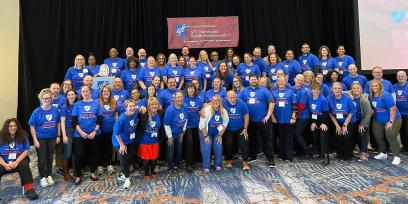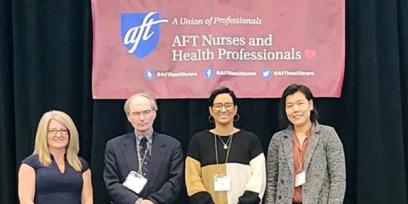AFT’s nurses and health professionals attended the Professional Issues Conference in Baltimore from Nov. 16 to 18. The overwhelming success of the Code Red campaign was at the center of the three-day gathering, which included pre-conference sessions, workshops, and panels that explored the complex issues healthcare professionals face today.
During the opening day luncheon, AFT President Randi Weingarten set the tone for the conference by recognizing the health professionals’ turbulent experience during the pandemic, which was characterized by fear, loss and exhaustion. Weingarten talked about the stark transition from being hailed as heroes to enduring worsening conditions in the corporate healthcare landscape. She also noted that collective anger of nurses and health professionals at seeing hospitals and businesses divert money from essential services such as staffing was a driving force for change, adding that the Code Red campaign emerged as a response—an active effort to transform anger and frustration into tangible change. The campaign targets inadequate staffing and holds healthcare corporations and government accountable through education, outreach, activism, contract bargaining, and legislation.
“This time last year there was a sense of helplessness, a sense of what we are going to do about this? But now we’ve created a campaign where we’re taking no excuses,” said Weingarten. “The fight creates agency; the fight creates possibility; the fight creates a sense that when we are together and working on something together, we can win,” she said emphasizing that this agency is key to gaining respect and turning around the pervasive problems within the healthcare system.
Panels provide insights into healthcare challenges
The conference featured numerous discussions to broaden participants’ understanding of the AFT’s mission to improve workplaces and reveal how the Code Red campaign is becoming an integral part of members’ everyday work.
James Frederick, the Occupational Safety and Health Administration’s deputy assistant secretary, provided insights into the agency’s strategy for health and safety enforcement during a session on the conference’s opening day. Frederick emphasized the need to make health and safety a core value, not just in the boardroom but throughout the workplace. He recognized the lack of equity in ensuring a safe environment for all workers, promising that the agency is working to change this.
A panel discussion on community engagement in the Code Red campaign explored the challenges of aligning community interests with labor advocacy.
Community activist Dani Cook weighed in on the delicate balance between patient advocacy and protecting healthcare staff. Cook stressed the need to highlight that advocacy is not against the administration but aimed at addressing unsafe environments and unfair positions faced by frontline workers. The panel encouraged members to be vocal about not accepting unsafe assignments and fostering collaboration between staff and leaders to ensure protection.
Dr. Kevin Kavanagh, founder and chair of Health Watch USA, highlighted the crucial role of patient advocates and organizations in preventing unsafe situations and promoting a safer working environment: “I think that's the strongest role of patient advocates or advocate organizations to prevent these situations from happening.”
He also called on union members to have a presence on hospital boards, urging them to lobby their hospital board members for changes because they are the authority to which the hospital CEO reports. He also suggested using tactics such as buying stock, attending board meetings and speaking up at stockholders’ meetings, all of which can empower individuals to target avenues beyond the CEO for effective change.
Jenny Chiang of Community Catalyst said unions have a lot of power to help members of their local communities who may be experiencing limitations in terms of access to healthcare, complex medical bills, and policies they don't understand. Union members can work with communities to encourage members to share their stories with hospital leaders.
Community activist Cook encouraged members to seek advocates within their communities if they find it challenging to use their own voice: “I cannot tell you the number of times I have staff who contact me and tell me things that are happening, and I call complaints on their behalf, and share information.”
In a panel focused on winning Code Red at work, members from the Oregon Federation of Nurses and Health Professionals and the Ohio Nurses Association shared their strategies. OFNHP’s Joshua Holt and ONA’s Rick Lucas emphasized the importance of storytelling and community support in achieving success. They highlighted the need to build a compelling narrative that resonates with the employer and the broader community. Lucas stressed that member engagement is crucial throughout the entire process. The panel’s consensus was clear: Starting early with a well-thought-out plan, even if imperfect, sets the foundation for success.
The conference's final day featured a panel discussion with AFT Connecticut’s John Brady, Washington State Nurses Association’s David Keepnews and Oregon Nurses Association’s Anne Tan Piazza; the discussion focused on the lessons from safe staffing legislation campaigns. Each panelist shared insights into the crucial role of member organizing in training individuals for lobbying, public speaking and effective conversations. They underscored the importance of building a cohesive campaign that leverages both contract negotiations and legislative advocacy. The optimism in the room was palpable.
“There are people who are laying the groundwork right now that will enable you at some point in the future to do the same thing,” said Brady.
“What also gives me hope is the momentum,” said Piazza—“raising awareness about the power of unions and growing the exponential interest from healthcare workers in wanting to organize and joining unions so that we can be more powerful and change the world together.”
“People see what’s possible when we work together and assert our power,” said Keepnews.
[Adrienne Coles]



